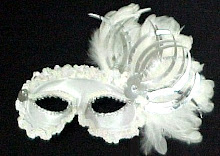
Charles Kean and his wife as Macbeth and Lady Macbeth, in costumes aiming to be historically accurate (1858).
Macbeth is among the best-known of William Shakespeare's plays, and is his shortest tragedy, believed to have been written between 1603 and 1606. It is frequently performed at both amateur and professional levels, and has been adapted for opera, film, books, stage and screen. Often regarded as archetypal, the play tells of the dangers of the lust for power and the betrayal of friends. For the plot Shakespeare drew loosely on the historical account of King Macbeth of Scotland by Raphael Holinshed and that by the Scottish philosopher Hector Boece.[1] There are many superstitions centred on the belief the play is somehow "cursed", and many actors will not mention the name of the play aloud, referring to it instead as "The Scottish play".
Characters
Scene from Macbeth, depicting the witches' conjuring of an apparition in Act IV, Scene I. Painting by William Rimmer
Duncan – King of Scotland
Malcolm – Duncan's elder son
Donalbain – Duncan's younger son
Macbeth – A general in the army of King Duncan. Thane of Cawdor,Thane of Glamis, King of Scots
Lady Macbeth – Macbeth's wife
Banquo – Macbeth's friend and a general in the army of King Duncan
Fleance – The son of Banquo
Macduff – The Thane of Fife
Lady Macduff – Macduff's wife
Macduff's Son
Lennox – A Scottish lord
Ross – A Scottish lord
Angus – A Scottish lord
Mentieth – A Scottish lord
Caithness – A Scottish lord
Siward – Earl of Northumberland, General of the English forces
Young Siward – The son of Siward
Seyton – A servant and attendant
Hecate – Chief witch/Goddess of Witchcraft
Three Witches
Three Murderers
Porter (or Messenger)
English Doctor
Scottish Doctor
There 's daggers in men's smiles". - (Act II, Scene III).
"what 's done is done".- (Act III, Scene II).
"I dare do all that may become a man; Who dares do more is none". - (Act I, Scene VII).
"Fair is foul, and foul is fair". - (Act I, Scene I).
"I bear a charmed life". - (Act V, Scene VIII).
"Yet do I fear thy nature; It is too full o' the milk of human kindness." - (Act I, Scene V).
"Will all great Neptune's ocean wash this blood clean from my hand? No, this my hand will rather the multitudinous seas incarnadine, making the green one red" - (Act II, Scene II).
"Double, double toil and trouble; Fire burn, and cauldron bubble." - (Act IV, Scene I).
"Out, damned spot! out, I say!" - (Act V, Scene I)..
"All the perfumes of Arabia will not sweeten this little hand." - (Act V, Scene I).
"When shall we three meet again in thunder, lightning, or in rain? When the hurlyburly 's done,When the battle 's lost and won". - (Act I, Scene I).
"If chance will have me king, why, chance may crown me". - (Act I, Scene III).
"Nothing in his life became him like the leaving it; he died as one that had been studied in his death to throw away the dearest thing he owed, as 't were a careless trifle". - (Act I, Scene IV).
"Look like the innocent flower, but be the serpent under 't." - (Act I, Scene V).
"I have no spur to prick the sides of my intent, but only vaulting ambition, which o'erleaps itself, and falls on the other." - (Act I, Scene VII).
"Is this a dagger which I see before me, The handle toward my hand?" - (Act II, Scene I).
"Out, out, brief candle! Life's but a walking shadow, a poor player that struts and frets his hour upon the stage and then is heard no more: it is a tale told by an idiot, full of sound and fury, signifying nothing." - (Act V, Scene V).



No comments:
Post a Comment